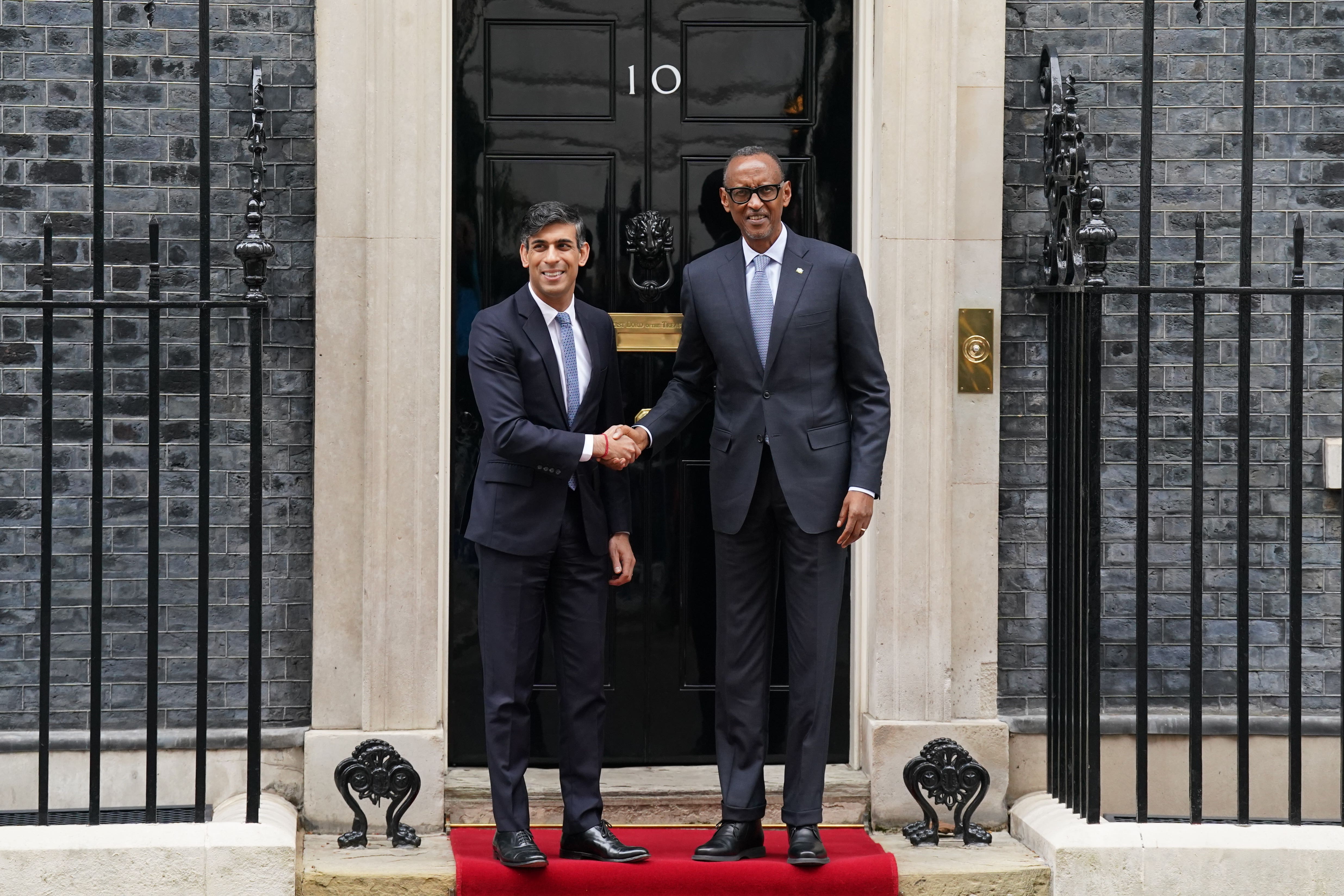The government says the capital of Rwanda is safer than London. Is it?
Andrew Mitchell, the deputy foreign secretary, made the astonishing claim that Kigali is safer than London. But 30 years on from the Rwandan genocide, can that really be true? Colin Drury reports


The government has finally won its parliamentary battle to send asylum seekers to Rwanda – with Rishi Sunak promising to have the first flights in the air within 12 weeks.
In passing the new law, ministers ignored a ruling by the Supreme Court that Rwanda is not a safe country, and have decided that, in fact, it is. And according to Andrew Mitchell, the deputy foreign secretary, not only is it safe, but Kigali, the Rwandan capital, is safer than London.
“It is absolutely extraordinary what the Rwandan government has achieved in all walks of life,” said Mr Mitchell. “It is a safe country. And indeed, if you look at the statistics, Kigali is arguably safer than London.”
Is that true? Here, we look at the evidence...
Crime rates
It can certainly be argued that London is more dangerous now than when the Conservatives took power in 2010.
Cuts to police and council budgets over the last decade and a half have correlated with a surge in crime, not just in the capital but across much of the UK. Some 887,870 criminal offences were reported to the Met Police in 2021-22, up more than 140,000 on the figure for 2015-16.
Violent crime, sexual crime, knife crime and drug crime have all gone up during the same time span, and, while there is some evidence that this trend has now peaked, numbers are still far above those recorded in the middle of the last decade.
Still, Kigali is very far from crime-free. While direct comparisons are hard, we know that the homicide rate for Rwanda as a whole was 3.59 per 100,000 people in 2020, according to the World Bank. That’s more than double London’s rate of 1.5 per 100,000 population, and three times the rate of the UK as a whole.
Freedom of expression
When it comes to free speech and human rights, the government of Paul Kagame does not have many ardent admirers.
Critics of the president, who has ruled Rwanda since 1994, have been arrested, threatened and imprisoned. Journalists, bloggers and political opponents are among those who have been detained, often without trial. Claims of torture are commonplace. Suspicious deaths, ill treatment, and the use of unofficial detention centres have all been recorded by Human Rights Watch (HRW).
“At time of writing, several journalists and commentators were behind bars,” the global organisation’s World Report 2023 noted. “In some cases, they were arrested for speaking out about security force abuses, including unlawful and arbitrary detention, torture and extrajudicial killings, or for criticising the ruling Rwandan Patriotic Front and its human rights record. Allegations that the authorities beat or otherwise ill-treat political prisoners are common.”
The HRW report was not particularly kind about the UK, either, it should be said. Laws around protesters’ rights, new voter identification legislation, and access to food and housing for the most vulnerable in society were all roundly criticised.
Yet perhaps the most damning part of the HRW UK report was saved for – you guessed it – the new deportation bill. Sending asylum seekers to Rwanda, it said, would “undermine the refugee protection system”.
LGBT+ rights
The UK dropped from 14th to 17th in the 2023 European rankings published by the ILGA (International Lesbian, Gay, Bisexual, Trans and Intersex Association), a fall said to reflect a negative climate for transgender people as well as inadequate legal protections.
Rwanda, meanwhile, is one of the few countries in east Africa that does not criminalise same-sex relationships, and government policies in this area are generally seen as progressive compared to the rest of the continent.
Nonetheless, the London-based Rainbow Migration group has raised concerns over the idea of deporting LGBT+ people to the African city, highlighting how, in 2021, a dozen gay and transgender people were rounded up ahead of an international conference in Kigali. Those who were detained reported being told that they did not “represent Rwandan values”.
Along similar lines, Nizeyimana Seleman, executive director of the Hope And Care Organisation, a Rwandan group that works with LGBT+ people, has previously said that discrimination remains rife in the country.
“Many LGBTI people keep their sexuality and gender identity secret in an attempt to avoid rejection, discrimination and abuse,” he said. “Which, in the long run, inevitably denies them their basic human rights.”
Women’s rights
In the 2023 Global Gender Gap report, Rwanda ranked higher than the United Kingdom. It was 12th in the world. The UK lagged behind in 15th place.
This suggests that across four key indicators – economic opportunity, educational attainment, health, and political empowerment – women in the African country have access to greater equality than their counterparts here in Blighty.
Yet the experience of Liliane Mugabekazi suggests a rather different picture on the ground. In the summer of 2022, the then 24-year-old was arrested for “shameful dressing” after wearing a sheer dress to a concert in Kigali.
“She attended the concert while wearing clothes that reveal her private parts,” prosecutors said.
She faced two years in prison, though she was eventually released after 12 days.
Democratic freedoms
Both the UK and Rwanda will go to the polls later this year.
In Rwanda, Kagame will win: at the last election, in 2017, he won another seven-year term with 99 per cent of the vote. It followed a 2015 referendum in which he sought the power to stand for a third term. HRW recorded a “chronology of violations” of the electoral process, and the US Department of State noted “irregularities observed during voting”.
In the UK, meanwhile, Rishi Sunak will almost certainly lose, because in Britain, elections are not a sham cover for an authoritarian ruler.
Health outcomes
Since the end of the civil war in 1994, the transformation of public health in Rwanda – along with the country’s healthcare system – has been nothing short of remarkable. Infant mortality at that time had shot up to 190 per 1,000 babies: almost one in five babies was expected to die before reaching the age of one. Systematic rape, used as a weapon of conflict and genocide, had caused an acute HIV crisis.
Today, the situation couldn’t be more different. The country is widely considered to have one of Africa’s highest-quality universal healthcare systems, with Kigali itself served by a network of health centres and highly regarded hospitals. Life expectancy now stands at 66, according to World Bank Open Data, while infant mortality has been cut to 30 per 100,000 babies.
All the same, these figures remain – as one might expect – some way behind the statistics for the UK. Here, the infant mortality rate is just 3.7 per 1,000 babies, while life expectancy is more than a decade higher, at 78.
Safety of the built environment
It would be wrong to say that residents of Kigali are at constant risk of collapsing buildings or fire – but the UK government itself advises travellers to at least be aware of those dangers while in Rwanda.
“Levels of building health and safety are lower than in the UK,” the British government website says. “Buildings and construction sites have collapsed, causing deaths and serious injuries. Fire safety standards vary and fires in residential and public places are a continuing risk. Poor wiring and substandard electrical cables have caused building fires. Take extra care when using electronic equipment.”
Presumably, those set to be deported there will be given the same advice.
Subscribe to Independent Premium to bookmark this article
Want to bookmark your favourite articles and stories to read or reference later? Start your Independent Premium subscription today.






Join our commenting forum
Join thought-provoking conversations, follow other Independent readers and see their replies
Comments